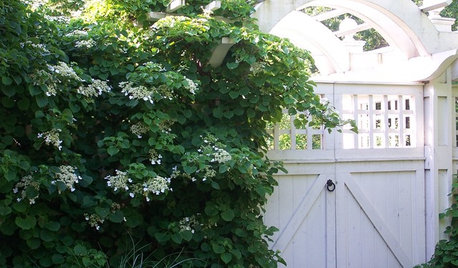Lists of resistant tomatoes
gardener_sandy
14 years ago
Related Stories

EDIBLE GARDENSSummer Crops: How to Grow Tomatoes
Plant tomato seedlings in spring for one of the best tastes of summer, fresh from your backyard
Full Story
GARDENING GUIDESGreat Garden Combo: 3 Wonderful Plants for a Deer-Resistant Screen
Protect your privacy and keep deer at bay with a planting trio that turns a problem garden area into a highlight
Full Story
CONTAINER GARDENS7 Deer-Resistant Flowers for Your Summer Containers
Grow these as protection for edibles or just for their colorful beauty — deer might not like them, but everyone else will
Full Story
COLOR10 Reasons to Make a Splash With Tomato Red
You won’t duck at these tomatoes. See how bold red shades can play up architecture, light up a dark spot and add drama
Full Story
GARDENING GUIDES6 Deer-Resistant Ground Covers to Plant This Fall
Learn about some of the only low, spreading plants that are reliably deer-resistant
Full Story
TREES7 Deer-Resistant Flowering Trees to Plant this Fall
If you live in a neighborhood with roaming deer, consider these beautiful trees that won't tempt hungry guests
Full Story
FALL GARDENING6 Deer-Resistant Flowering Vines to Plant This Fall
Have a major deer problem? Here are some of the only vines that have a chance of not being eaten
Full Story
GARDENING GUIDES10 Deer-Resistant Native Flowers to Plant This Fall
Learn about natives that embrace some kinds of wildlife but resist grazing deer
Full Story
GARDENING GUIDES8 Deer-Resistant Elegant Evergreen Shrubs to Plant This Fall
Who knew that such beautiful shrubs could be deer-resistant?
Full Story
GARDENING GUIDESTop 12 Summer-Blooming Perennials for Deer-Resistant Drama
Can you have garden color, fragrance and exciting foliage with hungry deer afoot? These beauties say yes
Full StoryMore Discussions







carolyn137
gardener_sandyOriginal Author
Related Professionals
Folsom Landscape Architects & Landscape Designers · Foothill Ranch Landscape Architects & Landscape Designers · White Oak Landscape Architects & Landscape Designers · Concord Landscape Contractors · Berkley Landscape Contractors · Framingham Landscape Contractors · Hampton Bays Landscape Contractors · Lyndhurst Landscape Contractors · Merced Landscape Contractors · St. Louis Landscape Contractors · Alabaster General Contractors · Galveston General Contractors · Geneva General Contractors · Mount Laurel General Contractors · Paradise Valley Decks, Patios & Outdoor Enclosurescolokid
carolyn137
orchid126
gardener_sandyOriginal Author
fusion_power
gardener_sandyOriginal Author
carolyn137
gardener_sandyOriginal Author